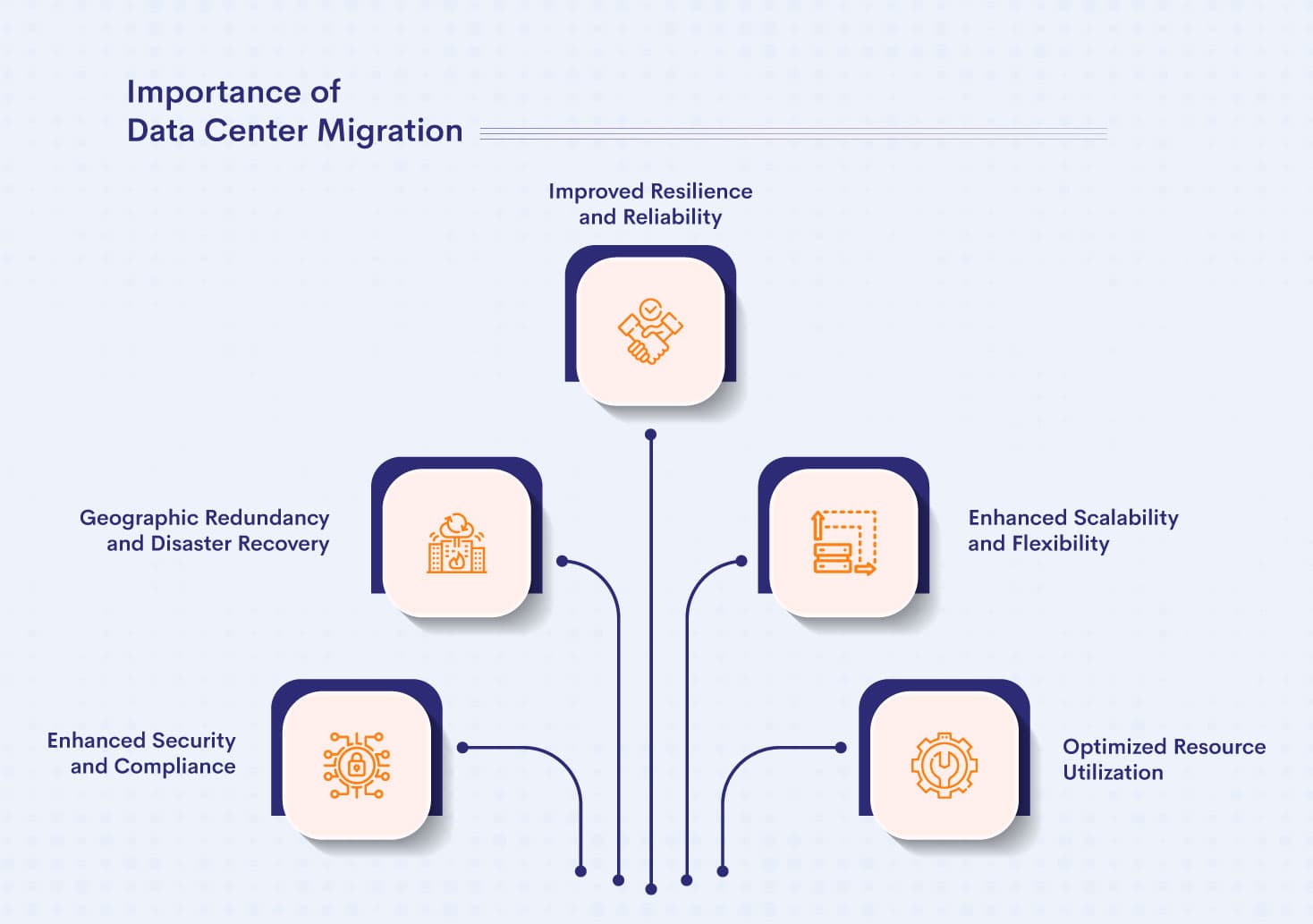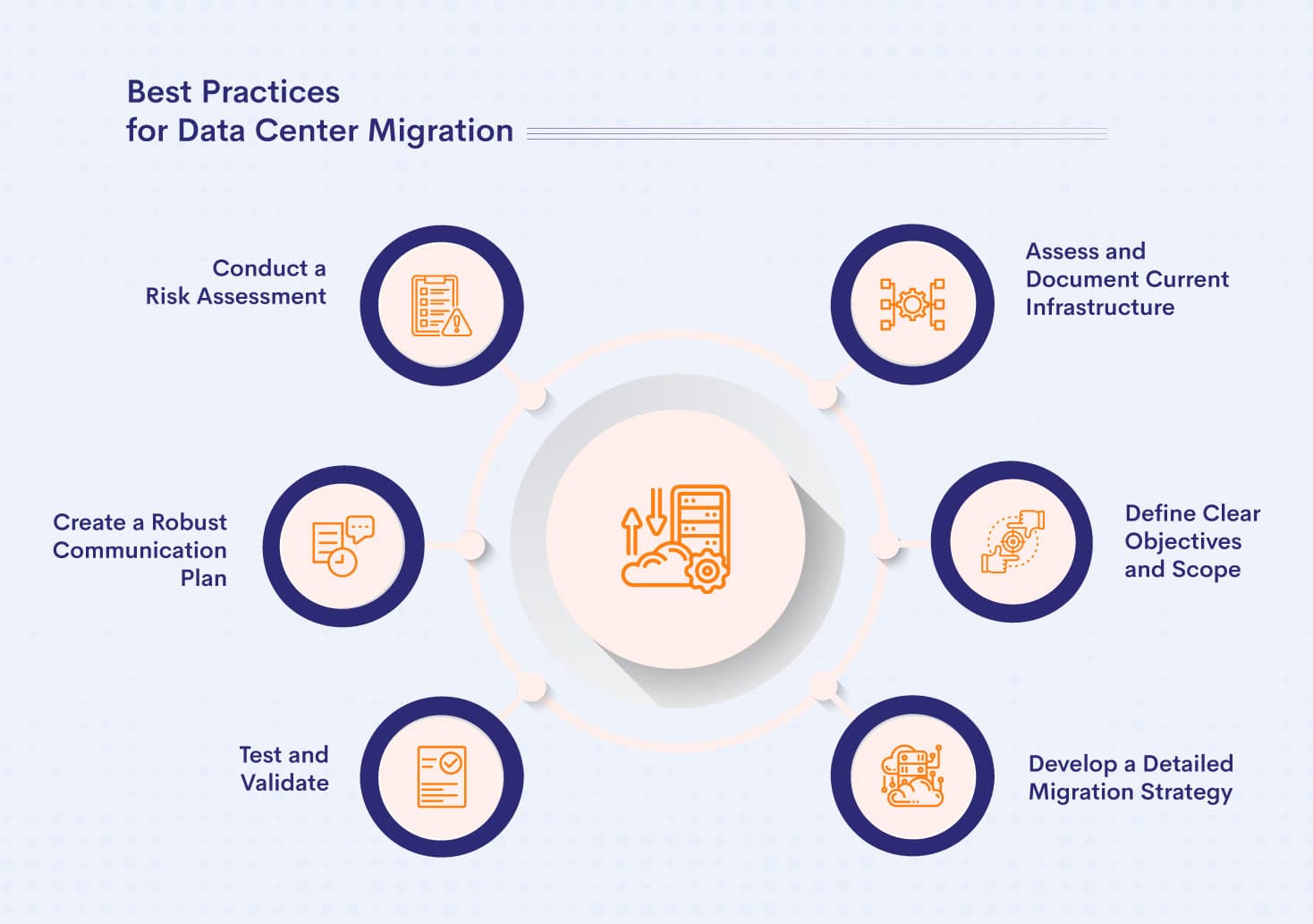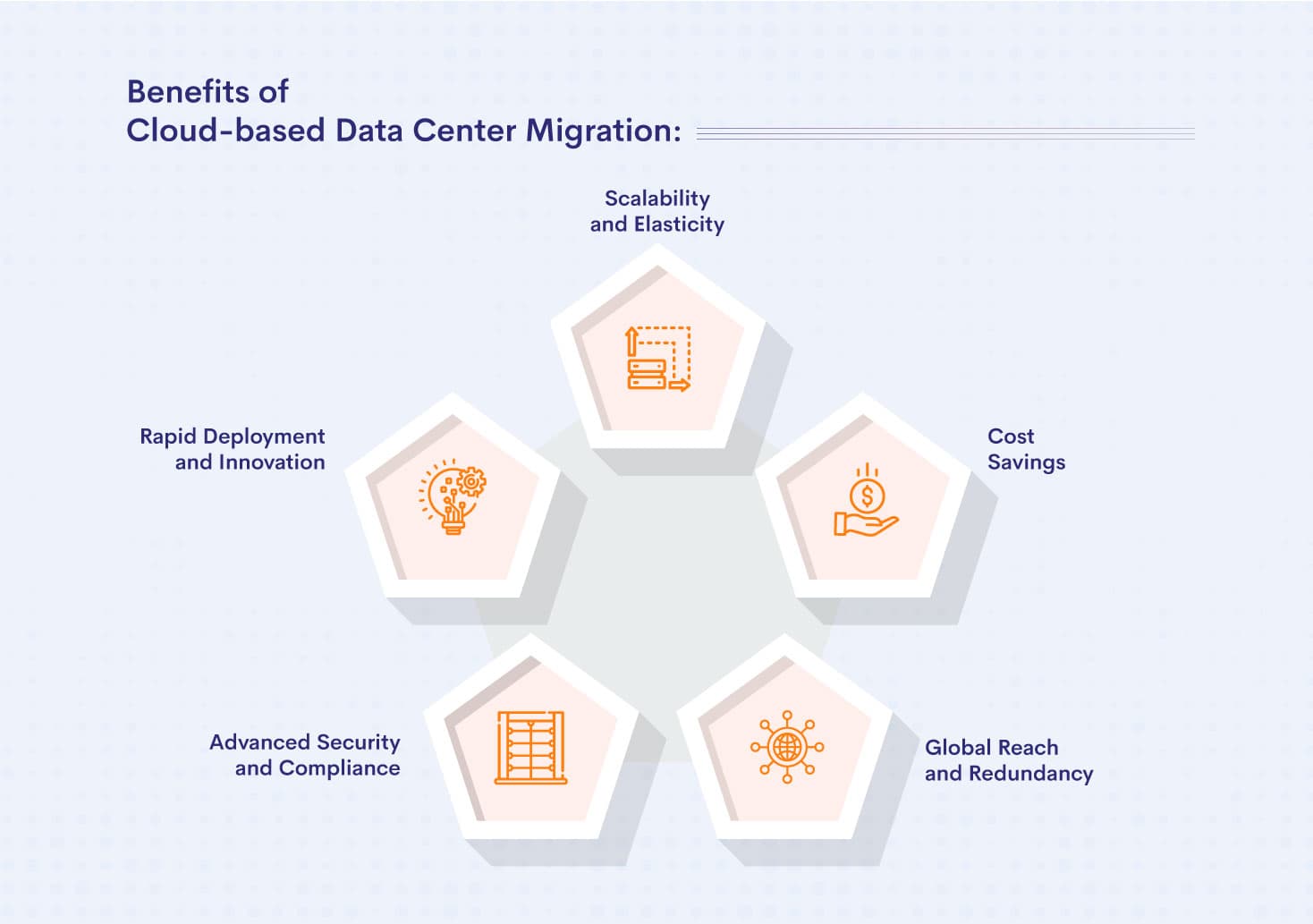- Blog
- July 13, 2023
Data Center Migration: Importance, Best Practices, and Benefits

- Blog
- July 13, 2023
Data Center Migration: Importance, Best Practices, and Benefits
Data center migration, commonly known as DC migration is a mission-critical process that demands meticulous planning and execution to ensure a seamless transition while safeguarding crucial business operations. Organizations embark on data center migration for a multitude of reasons, such as upgrading infrastructure, achieving enhanced scalability, bolstering security measures, and optimizing costs. In this blog article, we have discussed the importance of data center migration, best practices for a successful migration, and the advantages of migrating to the cloud.
Importance of Data Center Migration:

- Improved Resilience and Reliability: Data center migration allows organizations to upgrade their infrastructure and implement modern technologies that enhance the resilience and reliability of their IT systems. By migrating to a new data center, organizations can leverage advanced hardware, networking, and security measures, minimizing the risk of downtime and ensuring uninterrupted service delivery to customers.
- Enhanced Scalability and Flexibility: Businesses need the flexibility to scale their IT infrastructure based on changing demands. Legacy data centers may not provide the scalability required to handle growing workloads or sudden spikes in traffic. By migrating to a new data center, organizations can embrace cloud-based solutions that offer elastic scalability, enabling them to seamlessly adjust resources to meet evolving business needs effectively.
- Optimized Resource Utilization: Data center migration presents an opportunity to optimize resource utilization and reduce costs. Legacy data centers often have inefficient layouts, outdated equipment, and redundant systems. By consolidating and modernizing infrastructure during the migration process, organizations can achieve better resource utilization, reduce energy consumption, and realize cost savings.
- Enhanced Security and Compliance: Ensuring robust security and compliance is paramount in today’s digital landscape. Data center migration allows organizations to implement advanced security measures and comply with industry standards and regulations. Cloud-based data centers provide built-in security features, such as encryption, access controls, and threat detection, enabling organizations to safeguard sensitive information and meet compliance requirements effectively.
- Geographic Redundancy and Disaster Recovery: Data center migration enables organizations to establish geographic redundancy, ensuring business continuity in the event of natural disasters, power outages, or other disruptions. By leveraging cloud-based solutions, organizations can replicate and synchronize data across multiple regions, providing redundancy and enabling efficient disaster recovery strategies.
Best Practices for Data Center Migration:

- Assess and Document Current Infrastructure: Thoroughly evaluate your current infrastructure, documenting all aspects including hardware, software, network configurations, and dependencies. This assessment will serve as a baseline for planning the migration and identifying potential challenges.
- Define Clear Objectives and Scope: Clearly define the objectives and scope of the migration project. Identify the reasons for the migration, such as improved resilience, scalability, or cost optimization. Establish specific goals and performance indicators to measure the success of the migration.
- Develop a Detailed Migration Strategy: Craft a well-defined migration strategy to minimize disruptions and ensure a seamless transition. Consider factors such as migration approach, timing, resource allocation, and dependencies. Define a realistic timeline with clearly defined milestones and allocate sufficient resources to each phase of the migration.
- Conduct a Risk Assessment: Thoroughly assess the risks associated with the migration process. Identify potential risks such as data loss, downtime, or compatibility issues. Develop a comprehensive risk mitigation plan that includes backup strategies, failover mechanisms, and contingency measures. Regularly monitor and update the risk assessment throughout the migration.
- Create a Robust Communication Plan: Establish a communication plan that includes all stakeholders, such as IT teams, business units, and external service providers. Clearly communicate the migration plan, key milestones, and any expected disruptions. Provide regular updates to ensure everyone is well-informed and aligned throughout the process.
- Test and Validate: Thoroughly test and validate the migrated infrastructure to ensure it functions as intended. Conduct rigorous testing of hardware, software, network connectivity, and security measures. Implement disaster recovery drills and failover tests to validate the effectiveness of backup systems. Data integrity and system functionality should be thoroughly tested to ensure a seamless transition.
The Benefits of Cloud-based Data Center Migration:
Cloud-based data center migration offers several appealing benefits that make it an attractive choice for organizations.

- Scalability and Elasticity: Migrating to the cloud allows organizations to leverage the scalability and elasticity of cloud infrastructure. They can easily scale resources up or down based on demand, ensuring optimal performance and cost efficiency.
- Cost Savings: Cloud-based data centers offer a pay-as-you-go model, allowing organizations to avoid upfront hardware investments and reduce ongoing maintenance costs. They can leverage shared infrastructure and only pay for the resources they consume, resulting in significant cost savings.
- Global Reach and Redundancy: Cloud providers have data centers distributed across various regions, providing organizations with the ability to deploy their applications closer to their users and establish geographic redundancy. This ensures high availability and improved performance for users across the globe.
- Advanced Security and Compliance: Cloud providers invest heavily in security measures and compliance certifications. Migrating to the cloud allows organizations to leverage these robust security features and benefit from regular security updates, threat monitoring, and compliance adherence.
- Rapid Deployment and Innovation: Cloud-based data centers enable organizations to rapidly deploy applications and services, reducing time-to-market and facilitating innovation. They can leverage managed services and preconfigured solutions, allowing them to focus on core business activities and accelerate digital transformation initiatives.
MSRcosmos – A Specialist in Cloud-based Data Center Migration
MSRcosmos is a trusted provider that specializes in cloud-based data center migration services, offering comprehensive solutions to facilitate a smooth and successful transition to the cloud. With a team of experienced professionals, MSRcosmos understands the unique challenges and benefits of cloud migration. We can assess your organization’s current infrastructure, develop a tailored cloud migration strategy, and execute the migration plan with precision. MSRcosmos has strong technology partnerships with Cloud hyper-scale providers such as AWS, Azure, and Google Cloud. We work closely with your team to identify the most suitable cloud platform, whether it’s public, private, or hybrid, based on your specific requirements. By following best practices and utilizing advanced migration tools, MSRcosmos ensures minimal downtime, data integrity, and optimal performance during the migration process. We also provide post-migration support, assisting with application testing, optimization, and ongoing management in the cloud.
Conclusion:
Data center migration is a strategic initiative that brings numerous benefits to organizations. By following best practices, such as thorough assessment, clear objectives, detailed planning, risk mitigation, effective communication, and thorough testing, organizations can successfully navigate the migration process. Additionally, migrating to the cloud offers scalability, cost savings, global reach, advanced security, and opportunities for rapid innovation. By combining best practices with cloud-based data center migration, organizations can position themselves for long-term success in the digital era.
With MSRcosmos as your trusted partner, you can confidently embark on a cloud-based data center migration journey, leveraging the scalability, flexibility, and cost savings offered by the cloud while minimizing risks and disruptions.




